Results
-
£69.00
UNO-Marsch - Robert Stolz
In the 1960's, Austrian composer Robert Stolz (1880-1975) wrote the "UNO-Marsch" op. 1275, the United Nations March. He was inspired and motivated by his friend Ralph Bunche, a U.S. diplomat and civil rights activist. Even as an adolescent, African-American Bunche was concerned with race issues and repression. With time he acquired high political status and was a mediator for the United Nations during several global crises. In 1950, he was the first Black person to be awarded the Nobel Peace Prize. The two friends Ralph Bunche and Robert Stolz (who had left his homeland in the National Socialism era) felt strongly connected by their revulsion of racial segregation and by their wish for humanity's peaceful coexistance."UNO-Marsch" honors the important work of the United Nations and is a musical tribute to the larger goal of peace. The composition gained particular European popularity when the Vienna Philharmonic Orchestra and conductor Mariss Jansons opened their famous New Year's concert in 2016 with "UNO-Marsch".
Estimated delivery 7-14 working days
-
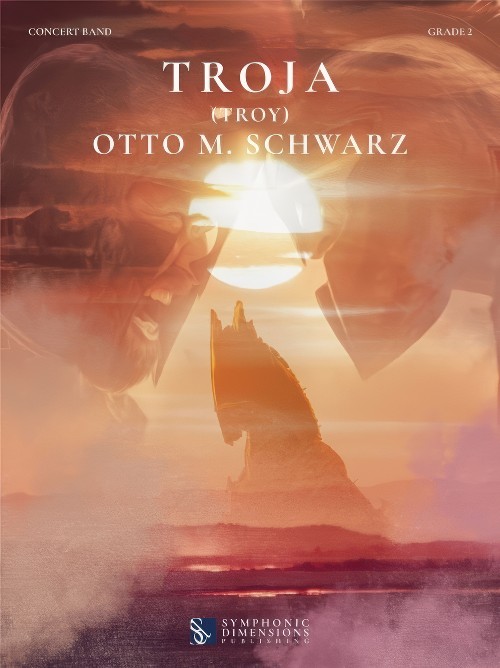 £79.99
£79.99Troja (Troy) (Concert Band - Score and Parts) - Schwarz, Otto M.
The Greek poet Homer wrote about Troy and the Trojan War, which probably took place in what is now Asia Minor, in his Iliad in the 8th century B.C. Nowadays, the term Trojan generally refers to a malware program that is used to gain unauthorised access to computers. This use comes from the legendary Trojan Horse, which saw the turning point in the battle between Greeks and Trojans through the cunning of Odysseus. Let us return to the beginning of the story: Paris, son of the king of Troy, is tasked by Zeus with judging the beauty of the three goddesses Aphrodite, Pallas Athena, and Hera. Aphrodite, the goddess of love, flatters Paris by promising him the most beautiful woman in the world. Soon afterwards, on a journey to Greece, Paris meets the beautiful Helen, who immediately falls in love with him. Since however she is the wife of Spartan king Menelaus, she eventually lets herself be kidnapped by Paris voluntarily. The Greeks then form a large army and go to war against Troy to retrieve Helen, leading to a ten-year siege of the city. The city is eventually conquered not through combat, however, but through Odysseus' cunning ploy. He has the idea of building an enormous wooden horse with warriors hidden inside. The horse is placed at the gates of the city. Thus, the Trojans are tricked into giving up the siege when, despite various warnings, they bring the horse into the city to dedicate it to the goddess Athena. At night, the soldiers climb out of the horse and open the gate for the Greek army. The troops storm the city and burn it to the ground. The royal family and all the Trojan warriors are killed, only Aeneas, the son of Aphrodite, escapes. Later, following many years' wanderings he and his acolytes will become known as the founders of the Roman people. There are various accounts of the fate of the beautiful Helen. She is said to have returned to Sparta with Menelaus and to have ruled there until the end of her life. Or maybe not...Duration: 6.00
Estimated delivery 7-14 working days
-
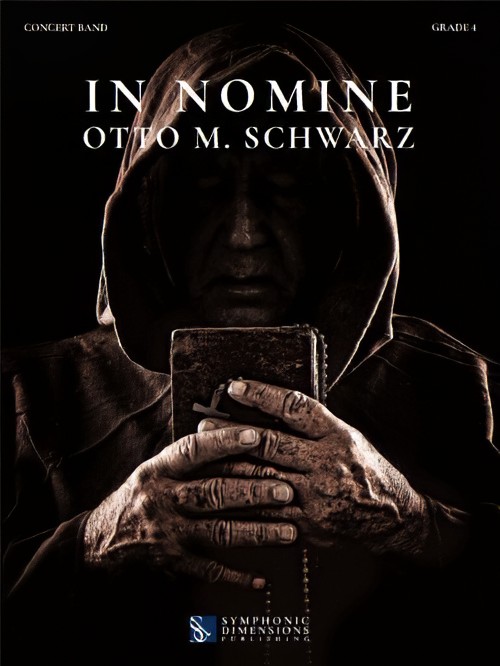 £159.99
£159.99In Nomine (Concert Band - Score and Parts) - Schwarz, Otto M.
How often has something been justified by, declared to be, or blessed as 'in the name of' some cause or other? How can it be that opposing armies and the use of weapons are ever 'in the name of...'? This is a common thread in the history of different faiths. Good was created but evil was committed and all 'in the name of...' This thread is also found in the history of the Premonstratensian Abbey at Wadgassen. The abbey was built in the 12th century on unfertile, desolate moorland, which later evolved into the most powerful religious community in the Saarland. The history of the abbey records quite astounding achievements under the motto desertum florebit quasi lilium ('the desert will bloom like a lily'); but also the harsh treatment of delinquents. The order had its own school, in which children were taught the seven liberal arts (which included music as well as geography and astronomy), but the poor were left to starve outside the abbey walls and were only allowed to eat from the members' leftovers on feast days. The medieval witch trials demanded their pound of flesh, and one group that fell victim were ecstatic dancers who moved wildly to music, which was interpreted as the devil's work. The result: a show trial that sentenced the dancers to death by fire. All in the name of... The year is 1789: Abbot Bordier is in the tenth year of his command. He does not yet know that he is to be the last abbot of an almost 700-year tradition. Not far from the abbey is the French border, which has long been making itself felt with the sound of gunfire, and the brothers continue to keep a nervous eye on it. The first portents of the French Revolution loom, but no one wants to believe it, that is, until the French pound the door down, storm the abbey and come right into the brothers' chambers. In a blind fury, all the pipes of the abbey organ are torn out, icons beheaded with swords and brothers beaten death while numerous buildings are set on fire. The abbey church is in flames. A frantic and desperate escape begins. Abbot Bordier and a handful of brothers make their getaway via the River Saar, adjacent to the abbey, to the neighbouring village of Bous. They survive, but their life, the Premonstratensian abbey, is destroyed. While they flee towards Prague and the sanctuary of the Strahov Monastery, the abbey at Wadgassen is razed to the ground and becomes a stone quarry. The desert blooms once more, however. A few short decades later, a glasswork arises from the foundations of the abbey. As peace returns to the region, it brings jobs and a new vision for its people.Duration: 11.15
Estimated delivery 7-14 working days
-
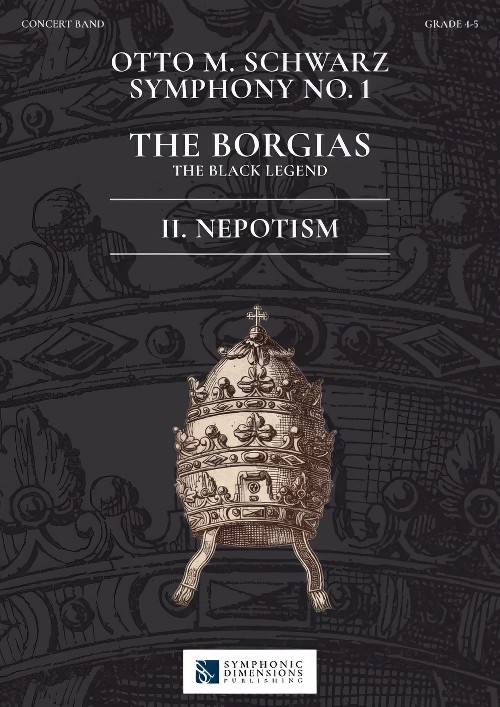 £148.99
£148.99Nepotism (Movement II from Symphony No.1, The Borgias) (Concert Band - Score and Parts) - Schwarz, Otto M.
A sinister legend hangs over the Borgia family, a legend of corruption, abuse of power, orgies, sex and murder. These rumours proliferated especially during the papacy of Alexander VI, a descendant of the family, who was even called the Antichrist. On his death, contemporary witnesses reported that the devil himself prowled around the death chamber and a black dog run along the corridors of the Vatican as his emissary. One might say that this Borgia pope, who ruled together with his family with the greatest brutality, became demonised. Unscrupulousness, poison-toting, incest and other malice are to this day the hallmarks of this pontiffNepotism: Rodrigo Borgia was elected Pope on 11 August 1492. From the very start, the new pope was prepared to use any means to eliminate his opponents, either through the infamous Borgia poison or by excommunication and execution. His son Cesare, who wanted little to do with the church, was appointed cardinal against his will. Alessandro Farnese, broth of Giulia Farnese, the Pope's mistress, also became a cardinal. Numerous Spaniards were brought into the country and were appointed to ecclesiastical posts. This infuriated the opponents of Alexander VI. The Dominican Girolamo Savonarola from Florence demanded the removal of the Pope. He was tortured and banned. Giuliano della Rovere wanted to convene councils to depose the Pope, which Alexander managed to prevent through artful political manoeuvrings. Through great brutality, brilliant political skill and power games, this pope was able to achieve his goal of leaving for his children a great legacy. Alexander VI constantly changed his allies and always acted unscrupulously to improve his financial situation and expand his sphere of influence. At the centre of the second movement of this work is the medieval hymn Dies Irae (Day of Wrath), which acts as a warning in the background condemning the Pope's actions.Duration: 9.15
Estimated delivery 7-14 working days
-
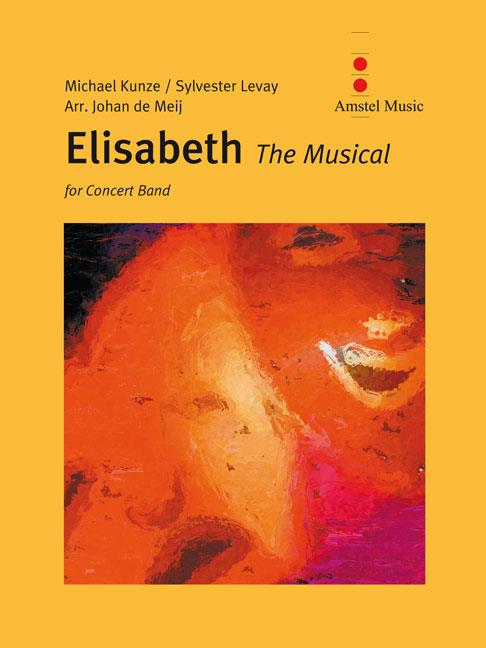 £118.99
£118.99Elisabeth (Concert Band - Score and Parts)
The world premiere of the musical Elisabeth took place in Vienna on September 3, 1992. From the great acclaim with which the musical was received, it became clear that the life of the Empress of Austria still appeals to the imagination. Although Elisabeth's life (1837-1898) as an Empress has a fairy-tale-like beginning, it takes a gloomy turn. In this production, Luigi Lucheni, the man who finally takes her life, tells her story. Death plays a major role throughout Elisabeth's life. In the musical, an equally mysterious and attractive man portrays the phenomenon of death, seducing her to the realm of death time after time. Elisabeth's life resembles a fairy tale when she marries the Emperor Franz Joseph at the age of sixteen. Her mother-in-law, Archduchess Sophie, does not make it easy on Elisabeth. But it is life itself that puts the Empress to the test. First, her youngest daughter dies. Then, not long after her son Rudolf is born, her happiness is clouded when her mother-in-law decides she must take pity on him. After her husband's unfaithfulness and Sophie's death, Elisabeth is so disillusioned that she chooses a travelling existence without realizing her husband and her son, Rudolf, miss her. Rudolf's loneliness is one of the reasons he commits suicide. The accumulation of disappointments in Elisabeth's life almost drives her into the arms of Death. In the end, however, it is Lucheni who kills her.Duration: 8.30
Estimated delivery 7-14 working days
-
 £84.99
£84.99Remembrance Day - Jacob de Haan
Remembrance Day (Totengedenken) is a chorale-like piece in memory of those who have died in service. Jacob de Haan composed this work for a concert by the symphonic wind orchestra Symphonic Winds, which he conducted in Germany on Volkstrauertag (national remembrance day). The composition is based on a text from Totengedenken (Commemoration of Those Who Have Died). This narrative text is provided in four languages, and is intended to be spoken (using a microphone) ad libitum during the performance. Choir parts are also available to complement the performance.
Estimated delivery 7-14 working days
-
 £84.99
£84.99Toccata - Claudio Monteverdi
Claudio Monteverdi composed this toccata as an instrumental introduction for the opera L'Orfeo (1607). According to the composer, this introduction should be played three times before the rising of the curtain. This is actually the first overture in the history of opera.)The story of Orfeo, who enchanted nature with his music, is tragic, as he loses his beloved Eurydice and decides to retrieve her from the underworld. On their return journey, one glance back at her is fatal: he loses her for the second time.)This arrangement for wind band is very suitable as a concert opener. The toccata is played three times just like the original. The first time it is played by a quintetconsisting of two trumpets and three trombones.)Various ways of performing this toccata are possible. The tension builds up more intensely if the quintet starts off stage. Eventually, these five players join the band, after which the tutti version follows two times. You can also have the brass play from the gallery during the second or third time for a double choir effect.
Estimated delivery 7-14 working days
-
 £179.99
£179.99Monastery Tales - Thomas Doss
Within the old monastery walls that today are home to the school that commissioned this work, a school orchestra is rehearsing: young people who stay together and make music; a teacher, who does what he can to bring the students, the music and the orchestra together. The concerts begin and the first successes soon follow. Then comes a tragic death that brings the project to its knees. The mood is forlorn. No one expects to continue with it. But 'now more than ever!' rings out. The message of this musical story is that when a teacher has ideals and commitment to his students, anything is possible.
Estimated delivery 7-14 working days
-
£109.99
From Russia with Love
A characteristic of many Russian folksongs is the emotion that they contain - sometimes exceptionally fierce, sometimes, in contrast, resigned and melancholic. This makes the music captivating and gives it its special, distinctive atmosphere. The same can also be said for From Russia with Love, in which Roland Kernen has made use of three beautiful Russian love songs. In the cheerful and stirring Kalinka, the singer tells of a girl whom he fell head over heals in love with, so much so that she is always on his mind. Lutshje Bulo is the story of a man who wants to break up with his girlfriend and in Otschi Tschornije attention is focused on a dangerous woman who can seduce many menwith her piercing black eyes.
Estimated delivery 7-14 working days
-
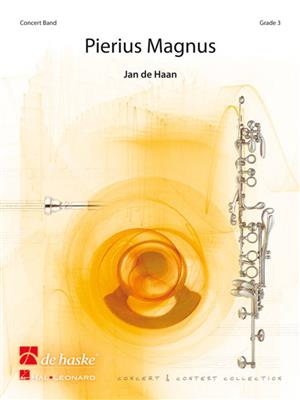 £144.99
£144.99Pierius Magnus - Jan de Haan
Pierius Magnus is a historical figure from the Friesland area of Holland. He was a farmer who became a resistance fighter against Dutch oppressors in around 1500. Whether Magnus was a hero or barbarian is still debatable, but composer Jan de Haan was fascinated by the exciting story and let it fuel his imagination. The protagonist is introduced with a capricious theme which is followed by "De Arumer Swarte Heap," the troops who took to the battlefields against the Dutch. An eerie calm takes over moments before Pier and his troops let their battle cries sound. The work ends as the disillusioned Pier retreats. A concert work overflowing with excitement!
Estimated delivery 7-14 working days
